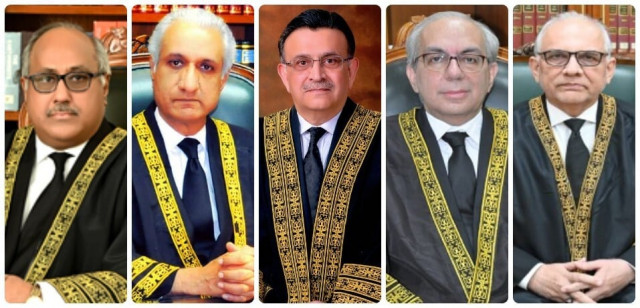SC also asks govt who leaks private audios
Questions as to why ministers held pressers without verifying clip authenticity

The country’s top judge has asked who leaked the audios featuring the voice of some serving and former members of the superior judiciary and their family members and why the authorities have not taken any action against those responsible for these leaks.
“Who leaked these audios? What action was taken against the Twitter account that published them?” asked Chief Justice of Pakistan (CJP) Umar Ata Bandial on Tuesday.
The CJP was leading a five-judge bench hearing pleas against a judicial commission formed by the federal government to probe into over half a dozen audio clips that have emerged in the last four months.
The government on May 19 formed a commission, led by SC judge Qazi Faez Isa and comprising Balochistan High Court Chief Justice Naeem Akhtar Afghan and Islamabad High Court Chief Justice Aamer Farooq to probe into the audios’ genuineness and their impact on the independence of the judiciary.
A number of petitioners challenged the commission and the five-judge Supreme Court bench on May 27 suspended the probe panel’s proceedings while hearing these petitions. The bench had noted that the government had not consulted with the CJP while forming the judicial commission.
The government and the commission chief later raised objections to the composition of the five-judge bench, requesting three of the judges including CJP Bandial to recuse themselves from hearing the petitions against the inquiry commission in view of “conflict of interest”.
Read Divided we stand: Supreme Court judges still poles apart
Responding to the CJP’s questions, Attorney General for Pakistan (AGP) Mansoor Awan said he on behalf of the federal government wanted to assure the court that it would unearth the truth through the commission and bring it to light.
Referring to the objections raised in the government’s reply to three bench members, the AGP said these objections should be discussed first.
In its instant application filed on May 31, the government urged the members of the bench – CJP Bandial, Justice Ijazul Ahsan and Justice Munib Akhtar—to “graciously consider recusing themselves from the instant petitions.”
It said Justice Bandial’s inclusion in the bench hearing petitions against the judicial commission raised concerns regarding objectivity as one of the audios pertains “to a very close family member” of the CJP.
The government’s plea also requested Justices Ahsan and Akthar to recuse themselves due to their involvement in some of the leaked audios.
Talking with reference to the government’s objections, the CJP said if the government thinks that three members of the bench are controversial then it will have to first explain how it presumed that inclusion of these judges in the bench constitutes a clash of interests.
He said the second important issue is the independence of the judiciary as the inquiry commission was formed without consulting the chief justice of Pakistan.
“The CJP is a constitutional post which has some constitutional and administrative authority. This authority is delegated to an acting CJP in the absence of the top judge. If the CJP is available then he will decide which judge is to be included [in a judicial commission],” he said.
Referring to Article 4 of the code of conduct of the Supreme Judicial Council, the AGP said the judges should not allow ‘their personal interest to influence’ their ‘official conduct’ or ‘official decisions’.
Read more Amidst polarisation: Controversy clouds CJP’s career
The CJP said they are not interested in the merit of the case.
“There are two basic questions: the first is about the independence of the judiciary and the second is about interference in the court’s internal matters.”
Reading out the terms of reference (ToR) of the inquiry commission, the AGP referred to an alleged conversation between the wife of a lawyer and the mother-in-law of the CJP.
Justice Munib Akhtar, a member of the bench, asked the AGP if the government believed that the audios were authentic. The AGP replied that the government has formed the commission to find that out.
Justice Akhtar noted that the government does not know whether these audios are authentic or not. However, federal ministers held press conferences soon after they surfaced.
“The country’s interior minister [Rana Sanaullah] held a press conference on one of these audios. Shouldn’t a minister resign who addressed the media on the alleged audios without first checking their authenticity?” he asked.
AGP Awan said the press conference of a minister does not represent the decision of the entire federal cabinet. Justice Akhtar said a person who is not sure about the authenticity of the audio cannot raise objections to the composition of the bench.
The AGP said the real question is whether the press conference was held before or after May 19. “The government had issued the inquiry commission’s ToRs on May 19,” he said.
The CJP noted that the court will ask the Pakistan Electronic Media Regulatory Authority (Pemra) and the media about the content and time of the press conference.
Later, the bench reserved its verdict on the government's objection to the composition of the bench after the petitioner’s counsel Shoab Shaheen presented his arguments.



1724319076-0/Untitled-design-(5)1724319076-0-208x130.webp)















COMMENTS
Comments are moderated and generally will be posted if they are on-topic and not abusive.
For more information, please see our Comments FAQ